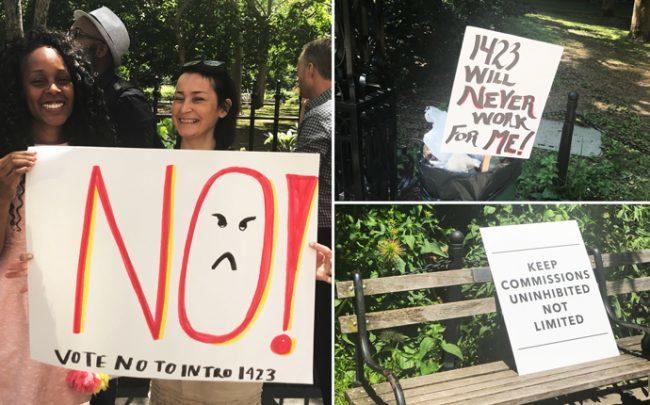Hundreds of real estate professionals converged Thursday on City Hall for a public hearing about bills aimed at reducing rent costs by capping broker fees.
In the baking sun, holding signs that said, “Don’t cap my income,” and “Agents are tenants too,” brokers waited for hours to be let on to the City Council grounds, where the Real Estate Board of New York organized a protest prior to the hearing. Due to overfill, many were forced to wait behind gates and could not take part.
The strong turnout spoke to the anger and frustration many brokers feel about the proposals, which they fear could dramatically cut their income. The City Council’s push follows landmark rent reforms passed in Albany earlier this month, and comes as debate about housing plays out at the federal level in the leadup to the 2020 election.
If passed, the City Council’s new measures would limit broker fees to one month’s rent in cases where the broker was hired by the landlord, an amendment made a month ago after three City Council members withdrew their support for a bill that would have capped all rental brokers’ commissions to one month’s rent.

Brokers hold various signs opposing Intro 1423
Standing on the street outside the City Hall grounds, John Lawerence, executive manager of sales at Douglas Elliman, said he had closed three offices he managed to come to the rally.
“I’m a salaried employee, so I’m not affected by this,” he said. “[But] I have 400 agents that work for me… they are very affected by this. Many are living on a month-to-month situation, paycheck to paycheck.”
Heather McDonough Domi, co-chair of the New York Residential Agent Continuum, also waited outside as members of her group handed out custom blue T-shirts and chatted before the rally. She said they had come to show support because the proposed measures would cut broker commissions by 40 percent, and she said renters would feel the consequences.
“The owners are going to have to make up that 40 percent and the way they’re going to make up that 40 percent is by increasing the rent,” said Domi, an agent at Compass.
Advocates of the bills believe changes are necessary to protect renters from steep upfront rental costs that prevent tenants from being able to move and discriminate against low-income and elderly renters.
“Some of the big things that keep people from moving are unreasonable brokers fees and security deposits,” said Andrea Shapiro, program manager at the Metropolitan Council on Housing, who attended the rally and previously met with City Council member Keith Powers, chief sponsor of the bill known as Intro 1423.
In addition to concerns about losing income, many brokers claimed their industry was being unfairly targeted by what amounted to government overreach. They argued that renters have the option to not use brokers at all, or, if so, to negotiate their fees.
“People that can’t afford the service, don’t ask for the service,” said Natasha Fontaine of Citi Habitats.
For activists like Shapiro, such arguments are not so simple. She said that renters are often told they would not have to pay a fee, only to find out later that they do.
“Sometimes it says there’s a broker fee in the advertisement, sometimes it doesn’t,” Shapiro said. “Sometimes it says there’s no fee and then it turns out there is a broker.”
Those who flocked to Thursday’s rally varied widely in age. Aldo Fleurantin, a broker with Bond New York, said he had been in the business for three years and estimated he would lose at least a third of his income if the measures passed.
“I would definitely want to reconsider what I’m doing in real estate, because I still have to pay my bills,” said Fleurantin, adding that he is a renter himself.
Inside the hearing, emotions ran high as a series of speakers appeared before Robert Cornegy, chair of the Committee on Housing and Buildings, and other City Council members to voice both support and opposition for the bills.
On multiple occasions, staffers were forced to tell those seated in the public gallery to quiet themselves after applause and yelling erupted across the room.
To get around such rules, audience members took to raising their palms in the air and wiggling their fingers when panelists said things they agreed with. They turned their thumbs down when panelists spoke in favor of the bills.
Ultimately, both sides put forward a human pitch — to protect renters and brokers.
“Please keep in mind that the vast majority of rental agents make less than $50,000 per year — and are tenants themselves,” Citi Habitats president Gary Malin said at the hearing. “These are not the brokers selling multimillion-dollar penthouses on cable TV. These are hard-working, middle-class people, many with families.”
It remains unclear when the City Council will vote on Intro 1423.
